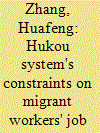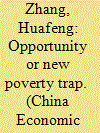| Srl | Item |
| 1 |
ID:
093842


|
|
|
|
|
| Publication |
2010.
|
| Summary/Abstract |
Most studies on discrimination against migrants in Chinese cities focus on wage differentials. This paper endeavours to develop an alternative way of explaining the institutional discrimination against migrants by studying workers' job mobility rates in three cities: Beijing, WuXi and Zhuhai. Migrants are commonly perceived to have high occupational mobility; however, Cox proportional hazards regressions in this paper show a different picture. Institutional discrimination reduces the number of jobs available to the migrants, increases their job search costs and the cost of losing jobs. Even though migrants take jobs unacceptable to local residents, the effects of this institutional discrimination still constrain migrants in changing jobs. The regressions show that temporary migrants have longer job durations and shorter unemployment durations than local people or permanent migrants. Moreover, migrants start to change jobs more often only after they have stayed in the city for some time and have accumulated enough assets to be able to survive when unemployed.
|
|
|
|
|
|
|
|
|
|
|
|
|
|
|
|
| 2 |
ID:
159050


|
|
|
|
|
| Summary/Abstract |
Despite its rapid economic growth, China has never managed to reduce its rural-urban divide with its reforms and marketization of the economy. The huge gap between urban and rural education is embedded in the disparity in educational investment, children's educational attainment, school quality and the returns to education. Migrant children move with their parents to urban cities to pursue a better education. However, the Chinese household registration system (hukou system) limits migrant children's rights and access to basic education in the cities. Will migrant children benefit from a better-quality education in the cities, or will they continue to be constrained by their hukou registration? Will the large-scale internal rural-urban migration provide the opportunity to reduce rural-urban education inequality in China, or will it merely create a new education-poverty trap? Based on publicly available large-scale survey data (RUMiC), this paper applies logistic regression and survival analysis to illustrate the new education-poverty trap imposed on migrant children by the institutional constraints and hierarchies in children's education, created by the Chinese household registration system in Chinese cities.
|
|
|
|
|
|
|
|
|
|
|
|
|
|
|
|